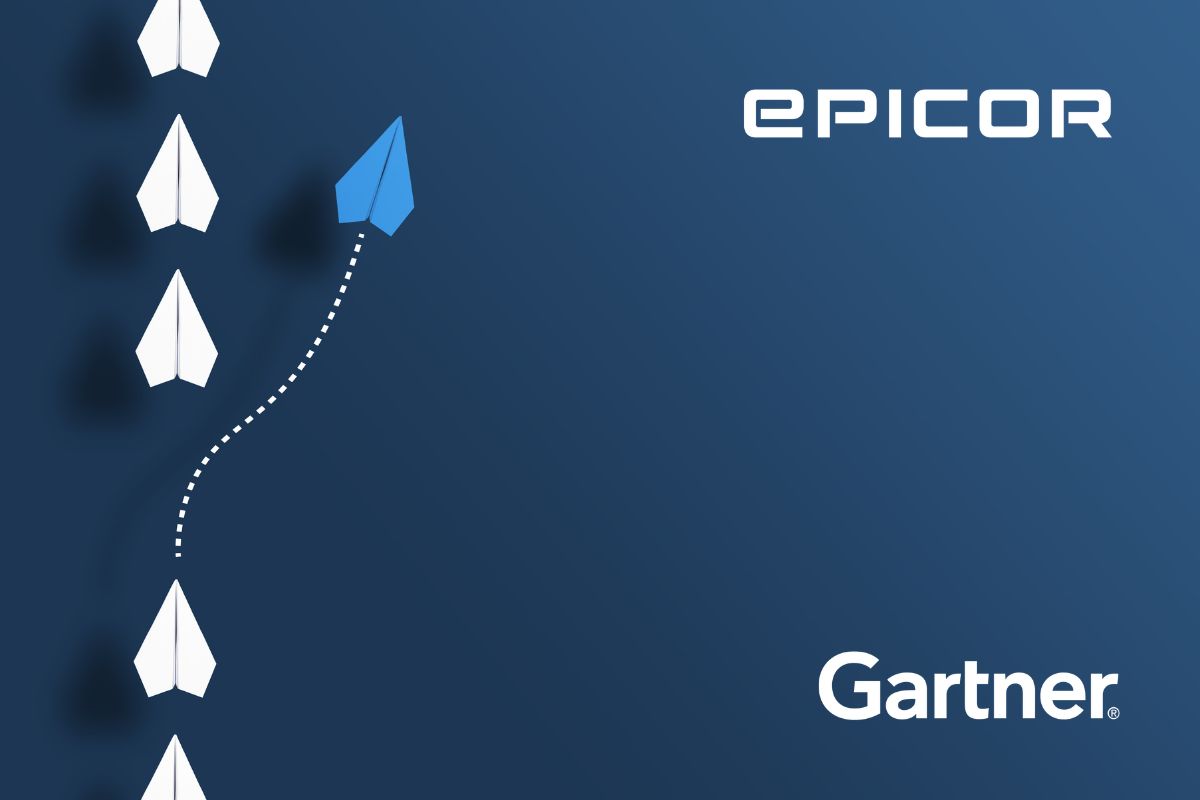Epicor has once again been named a Leader in the Gartner Magic Quadrant for Cloud ERP for Product-Centric Enterprises. This recognition reinforces Epicor’s role as an ERP leader and further highlights the adaptability and agility of the Epicor Industry ERP Cloud as a cognitive ERP platform ready for the future.
This is a significant milestone for Epicor and represents recognition from an influential global analyst firm that Epicor is a leading market contender.

Gartner’s Competitive Positioning Points for Epicor
Robust midsize offering for discrete: Epicor delivers a comprehensive ERP solution tailored specifically for midsize enterprises, consolidating core operational functions into a unified system. It effectively addresses the complex needs of discrete manufacturing, including engineering workbench and advanced subassembly operations, providing a single-vendor solution that simplifies management while enhancing efficiency.
Data-driven ERP approach: Epicor’s evolving product strategy emphasizes transitioning from a traditional transactional ERP model to a data-driven operational framework, supported by advanced AI and business intelligence capabilities. The company’s innovative “data as a service” (DaaS) approach facilitates enhanced data sharing both within organizations and across their extended ecosystems. This enables optimization of supply chain processes and minimizes production disruptions, paving the way for greater operational resilience.
Embedded integration platform as a service (iPaaS): Epicor’s Automation Studio offers a low-code integration platform that empowers users to streamline workflows and connect disparate systems with minimal coding expertise. By enabling seamless system integration and operational automation, this tool simplifies complex processes, driving productivity and operational efficiency.
Read the full report here
What is the Gartner Magic Quadrant?
Gartner Magic Quadrants are evaluative research reports that offer visual snapshots, in-depth analyses, and actionable advice that provide insight into a market’s direction, maturity, and participants.
Magic Quadrants compare vendors based on criteria and methodology established by Gartner. Each report comes with a Magic Quadrant graphic that depicts a market using a two-dimensional matrix that evaluates vendors based on their Completeness of Vision and Ability to Execute.
Gartner Magic Quadrant research methodology provides a graphical competitive positioning of four types of technology providers in fast-growing markets: Leaders, Visionaries, Niche Players, and Challengers.
A Gartner Magic Quadrant is a culmination of research in a specific market, giving you a wide-angle view of the relative positions of the market’s competitors.
What exactly is the Gartner Magic Quadrant for Cloud ERP?
This Magic Quadrant report covers product-centric ERP products in a cloud services application deployment. Gartner’s view of the market is focused on transformational technologies or approaches delivering on end users’ current and future needs.
Gartner defines Leaders as those with a track record of successfully delivering high-quality, cloud-native modernization and managed services. They are well-positioned to continue delivering leading-edge services into the future.
How are Leaders defined within the Gartner Magic Quadrant?
‘Leaders demonstrate a market-defining vision of how ERP product-centric systems and processes can be supported and improved by moving them to the cloud.’ They back this vision with a proven ability to deliver results through innovative products, robust services, and effective go-to-market strategies. With a strong market presence, these leaders consistently grow their revenue and market share. Their ability to secure deals across organizations of all sizes reflects their wide-ranging appeal. Leaders excel in providing comprehensive functionality across both operational and administrative ERP areas and demonstrate success through multiple, proven customer deployments. Furthermore, their solutions are frequently leveraged by systems integrator partners to drive transformative business initiatives.
Deep dive into the 2024 report findings
As seen in the report, the market for cloud ERP software for product-centric enterprises is defined as the ‘application technology that supports the automation of operational and financial activities for the manufacturing, distribution, delivery and servicing of goods’. What needs to be highlighted is that these ERP solutions do not only include operational and financial management capabilities, but they can also offer procurement, human capital management (HCM), and other industry-specific modules.
Read the full report here
According to Gartner, ERP remains one of the largest segments in the enterprise software market. In 2023, the ERP software market experienced a 13% growth, reaching $51 billion in total revenue, up from $45 billion in 2022. This growth was fueled by the increasing adoption of cloud ERP, price adjustments, advancements in AI, and the rise of industry-specific cloud solutions (refer to Market Share: Enterprise Resource Planning, Worldwide, 2023). Gartner reports that over 80% of this revenue came from cloud-based offerings, with only 20% from on-premises solutions—a trend expected to continue as cloud adoption accelerates.
While components like HCM and CRM have been leading the shift to the cloud, product-centric organizations have been slower to adopt due to their more complex operating models compared to service-centric counterparts. For example, revenue in the manufacturing and operations ERP subcategory grew by 10.5% in 2023, significantly outpacing the 2% growth seen in 2022, but still lagging behind other categories like HCM, which saw a 14% increase in the same period.
Looking ahead, Gartner forecasts that by 2027, 60% of organizations replacing ERP applications will prioritize platforms with robust business process orchestration and transactional capabilities. These features will be critical for delivering tailored, outcome-driven solutions alongside traditional ERP functionalities.
ATC as an Epicor Authorized Partner
As Epicor’s Authorized Partner and the Exclusive Distributor of Epicor Kinetic Solutions in Greece and Cyprus since 2001, we believe that this recognition validates our ability to provide manufacturers with the best ERP solutions.
Epicor ERP solutions and its past Gartner recognitions
- 2023 | Epicor Recognized as a Leader in the 2023 Gartner Magic Quadrant
- 2022 | A Challenger in the 2022 Gartner Magic Quadrant
- 2021 | Gartner recognizes Epicor for its vision and execution
- 2020 | Gartner ranks Epicor 1st in ERP Functionality for Midsize Enterprises
- 2019 | Epicor ranks 1st in the ERP Functionality in Gartner’s Critical Capabilities report for Cloud ERP for Product-Centric Midsize Enterprises
Gartner Disclaimer
Gartner, Magic Quadrant for Cloud ERP for Product-Centric Enterprises Dixie John, Denis Torii, Johan Jartelius, Tomas Kienast, November 11, 2024. GARTNER is a registered trademark and service mark of Gartner, Inc. and/or its affiliates in the U.S. and internationally, and MAGIC QUADRANT is a registered trademark of Gartner, Inc. and/or its affiliates and are used herein with permission. All rights reserved.
Gartner does not endorse any vendor, product or service depicted in its research publications, and does not advise technology users to select only those vendors with the highest ratings or other designation. Gartner research publications consist of the opinions of Gartner’s research organization and should not be construed as statements of fact. Gartner disclaims all warranties, expressed or implied, with respect to this research, including any warranties of merchantability or fitness for a particular purpose.





